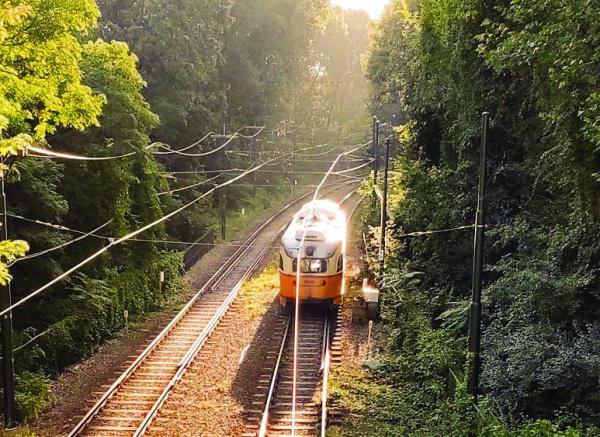April 20, 2022

The April 13 kick-off meeting for the MBTA’s Mattapan Trolley Transformation Project began and ended with one very important word: Sorry.
T officials met with the community for the first time in three years after a long-term rehabilitation project and short-term trolley restoration work both ran aground, resulting in delays that were made public a year ago.
Since that time, the agency and elected officials from the area have worked to get the projects back on track. Last Wednesday’s meeting was the public celebration of those efforts.
“A lot has happened in the past and we understand your skepticism,” said MBTA project manager AJ Tanner. “We’re going to work tirelessly to earn your trust.”
The projects, which will be done simultaneously, are the Presidential Conference Committee (PCC) trolley car refurbishment program, a multi-million-dollar effort that will restore the existing fleet of orange-colored trolley cars for short-term use, and a more involoved $114 million transformation project will rebuild all eight stations, lay new track infrastructure, upgrade signals, shore up bridges, and bring online new Light Rail Vehicles (LRVs) to replace the old trolley cars. The new cars are of the type being used on the Green Line now.
Last week’s meeting was scheduled as a means to address the latter work and to get it started again in earnest.
Part of earning that “trust” that the T’s Tanner spoke about is the bringing on of a design team, HNTB, and the completion of the survey of the existing conditions of the line in 2021. Additionally, to keep the community informed, the MBTA team pledged to have public meetings every six months. Hearing that, some residents were still skeptical of the project and wondered what was different this time – aside from the apologies issued at the start of the meeting.
“What has changed this time is we have HNTB contracted to do a 100 percent design of the project and I think that shows the T is very committed to moving forward and completing this,” said Tanner. “We have $114 million in funding already…The funding is there, and the design contract is there, and we’re committed to moving it forward.
“We understand the T has not done the best job engaging with the community and we’re trying our best now to right that wrong with the community,” he added.
Elected officials from Dorchester, Mattapan, and Milton attended the virtual meeting and all seemed upbeat about the work done with the MBTA since the delays were unearthed last year.
“We’ve been in continued conversations with the T and I’m grateful we’re finally having this meeting,” said state Rep. Brandy Fluker Oakley. “I’m looking forward to bringing the community up to date and being transparent about any delays and making sure you deliver what you promise.”
Said state Rep. Russell Holmes:: “We want to make sure you deliver this time. The trust will come when you do these small things right and you deliver these trolleys on time.”
Much of the details of the project are still to be determined, T officials said. For one example, rehabbing some of the stations and at-grade crossings along the line is quite complicated and bringing them to a level of ADA accessibility and safety will take time to figure out. Officials said they are currently analyzing each of the eight stations on the line with HNTB to see how they might approach them – while committing to the fact that all eight will be brand new and fully accessible. That approach includes the Ashmont and Mattapan Square terminus stations.
Two particular sore spots with the ridership are the frequent disruption of service, disruptions and stop closures, especially in the snow. At one time long ago, the Mattapan line could operate in heavy snow by employing train plows, but those days are long gone, said T officials, who noted that that problem was one of the main reasons why they lobbied in 2019 during community meetings for the LRVs (in 2019, the MBTA presented the community with several vehicle options, and the LRVs that are now used on the Green Line were chosen as the best replacement for the historic trolley cars).
“The PCC vehicles are from the 1940s and that vehicle has aged, and even with refurbishing them we can only hope to extend their lives another nine or ten years,” said the MBTA’s Angel Donahue. “When we get a certain amount of snow, we will still have to take them out of service because they don’t run. The implementation of the LRVs is meant to keep that from happening anymore. Until the LRVs come, we will still probably see the PCC vehicles go out of service.”
On that note, several residents suggested that in the interim, the MBTA needed to do a better job of informing residents of service disruptions and needed to do a much better job with the efficiency and frequency of replacement buses.
The switch to the LRVs will be a major change for residents along the historic Mattapan line – the only neighborhood trolley system left in the MBTA system.
Kenya Beaman, a life-long Mattapan resident, said she has taken the trolley from Mattapan Square to Ashmont all her life.
“Although I love the old style and the way our trolley looks now, I also know this style of trolley car will be phased out due to lack of parts to fix them,” she said. “I get that in the future we have to get new trolleys and as a Mattapan resident, I am okay with that.”
The next step in the project will be to bring the design up to the 15 percent milestone, work estimated to take 15 to 20 months. The MBTA has said they will hold another public meeting in the summer.
An email for the project has been established at trolley@mbta.com, and a phone hotline has been established at 617-222-3030.

Restored trolleys will be added to line one by one every five months, T says
After many delays, the MBTA put the first restored PCC trolley into service on the Mattapan line last month. Then, last week, the agency said last week it would be rolling out more restored vehicles in the coming months.
“Every five months a new car will be entered into the fleet through the refurbishment program,” said T official Angel Donahue.
He said the team on that refurbishment project has requested $12.2 million within the Capital Improvement Plan (CIP) that is currently being discussed publicly. That would be a $4 million increase in funding and would allow a group of workers to be dedicated solely to refurbishing the trolley cars.
The results of that request will be known later this spring when the CIP is released. Public comment on the CIP is being taken through April 25. One contact point: an email to cipengagement@mbta.com.
– SETH DANIEL


